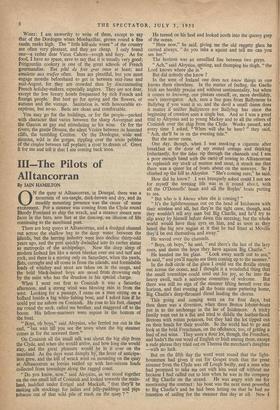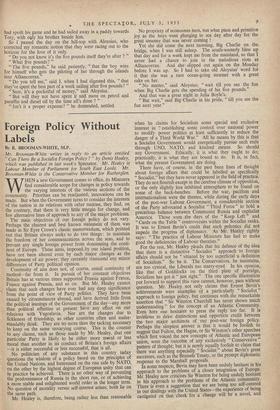III—The Pilots of Alltancorran
By LAIN HAMILTON ON the quay at Alltancorran, in Donegal, there was a mountain of sea-tangle, dark-brown and dry, and its steadily mounting presence was the cause of some excitement. For a steamer was coming from the Clyde round Bloody Foreland to ship the wrack, and a steamer meant new faces in the bars, new feet at the dancing, an illusion of life continuing to the moribund port.
There are long quays at Alltancorran, and a dredged channel out across the shallow bay to the deep water between the islands, but the herring industry went into decline thirty-odd years ago, and the port quickly dwindled into its earlier status as metropolis of the archipelago. Now the deep sleep of modern Ireland lies like a moist blanket over sea and turf and rock, and there is a stirring only on Saturdays, when the yawls, flats, curraghs and all come in from the islands, and formidable loads of whiskey and stout are taken on in the snugs, and the bold black-haired boys are saved from drowning only by the saint who has the drunken in his special charge.
When I went out first to Coninish it was a Saturday afternoon, and a strong wind was blowing rain in from the west. Looking for a passage, I came on a man sitting on a bollard beside a big white fishing boat, and I asked him if he could put me ashore on Coninish. He rose to his feet, clasped me round the neck, called me brother, and staggered off to the booze. His fellow-mariners were supine in the bottom of the boat.
" Boys, oh boys," said Aloysius, who ferried me out in the end, " but wait till you see the town when the big steamer conies in for the seaweed there."
On Coninish all the small talk was about the big ship from the Clyde, and when she would arrive, and how long she would stay, and the great pleasure would be in it over on the mainland. As the days went damply by, the fever of anticipa- tion grew, and the hill of wrack went on mounting on the quay at Alltancorran as lorries rattled up with last-minute loads collected from townships along the ragged coast.
" Do you know, now," said Aloysius, as we stood together on the one small hill of Coninish and looked towards the main- land, huddled under Errigal and Muckish, " that they'll be making silk stockings for ladies and jelly-puddings and pipe tobacco out of that wild pile of trash on the quay ? " He turned on his heel and looked north into the queasy grey of the ocean.
" Here now," he said, giving me the old raggety glass he carried always, " do you take a squint and tell me can you see her."
The horizon was an unsullied line between two greys.
" Ach," said Aloysius, spitting, and thumping his thigh, " the Lord knows where she is."
But did nobody else know ?
In the west of Ireland one does not know things as one knows them elsewhere. In the matter of feeling, the Gaelic Irish are harshly precise and without sentimentality, but when it comes to knowing, one pleases oneself, or, more devilishly, one's interrogator. Ach, sure a bus goes from Ballymore to Ballybeg if you want it so, and the devil a small damn does it matter if neither Ballymore nor Ballybeg has since the beginning of creation seen a single bus. And so I was a great trial to Aloysius and to young Mickey and to all ,the others of Coninish over the ship from the Clyde. Weeks passed, and every time I asked, " When will she be here? " they said, Ach, she'll be in on the evening tide."
But she never came.
One day, though, when I was .smoking a cigarette after breakfast at the door of my rented cottage and thinking (reluctantly, for the tides rip through the channels and I am a poor enough hand with the oars) of rowing to Alltancorran to replenish my stock of mutton and stout, it struck me that there was a queer lot of boats about on the seaways. So I climbed up the hill to Aloysius. " She's coming sure," he said. How did he know? I was brusquely asked could I not see for myself the teeming life was in it round about, with all the O'Donnells' boats and all the Boyles' boats putting to sea.
" But who is it knows when she is coming? " " It's the lighthousemen out on the head of Inishmore with their wireless and all, but they're the tight crew, though, and they wouldn't tell any man but Big Charlie, and he'd try to slip away by himself before dawn this morning; but the whole world would have their eyes on him, and as soon as they heard the big new engine at it that he had fitted at Moville they'd be out themselves and away."
He waved over the channels.
" Boys, oh boys," he said, " and there's the last of the lazy ones, and damn the hope they have against Big Charlie." He handed me his glass. " Look away north out to sea," he said, " and you'll maybe see them coming up to the steamer." In the dull circle of the glass I could see the flotilla strung out across the ocean, and I thought it a wonderful thing that the small townships could send out for joy, so far into the heavy swell, such a seaborne committee of welcome. But there was still no sign of the steamer lifting herself over the horizon, and that evening all the boats came puttering home, Big Charlie's deep-throated diesel leading the chorus.
This going and coming went on for four days, but then there was a diversion, when three Breton lobster-boats put in to the anchorage in the lee of Inishmore. A tricky family went out in a flat and tried to diddle the leather-faced Bretons with rotten potatoes, but they had the lot tipped out on their heads for their trouble. So the world had to go and look at the bold Frenchmen, on the offchance, too, of getting a feed of red wine. They were a dour lot, though, the Frenchies, and hadn't the one word of English or Irish among them, except a rude phrase they tried out on Theresa the merchant's daughter —with no luck.
But on the fifth day the word went round that the light- housemen had given it out for Gospel truth that the great steamer from the Clyde was off Lough Swilly, and a man who had promised to take me out with him went off without me because I had called out to him when he was in the company of Big Charlie on the strand. He was angry with me for mentioning the contract: his boat was the next most powerful to Big Charlie's and he had been letting on that he had no intention of sailing for the steamer that day at all. Now I had spoilt his game and he had sailed away in a, paddy towards Tory, with only his brother beside him.
So I passed the day on the hill-top with Aloysius, who corrected my romantic notion that they were racing out to the horizon for the love of it only.
" Do you not know it's the five pounds itself they're after ? " " What five pounds? " "The five pounds," he said patiently, " that the boy wins for himself who gets the piloting of her through the islands into Alltancorran. '
" Do you tell me," said I, when I had digested this, " that they've spent the best part of a week sailing after five pounds? " " Sure, it's a pocketful of money," said Aloysius. " But will they not have spent it and more on petrol and paraffin and diesel oil by the time all's done ? "
Isn't it a proper expense? " he demanded, nettled. No propriety of economies here, but what plain and primitive joy as the boys went plunging to sea day after day for the great steamer that was never coming I Yet she did come the next morning, Big Charlie on the bridge, when I was still asleep. The south-westerly blew up that day and for a week kept me from the mainland, so that I never had a chance to join in the melodious riots at Alltancorran. And she slipped out again on the Monday before I was up. So I had to take old Aloysius' word for it that she was a rare ocean-going steamer with a great rake on her.
" No matter," said Aloysius; " wait till you see the fun when Big Charlie gets the spending of his five pounds." And that was a great night in Julia Boyle's.
" But wait," said Big Charlie in his pride, " till you see the fun next year."



























































 Previous page
Previous page